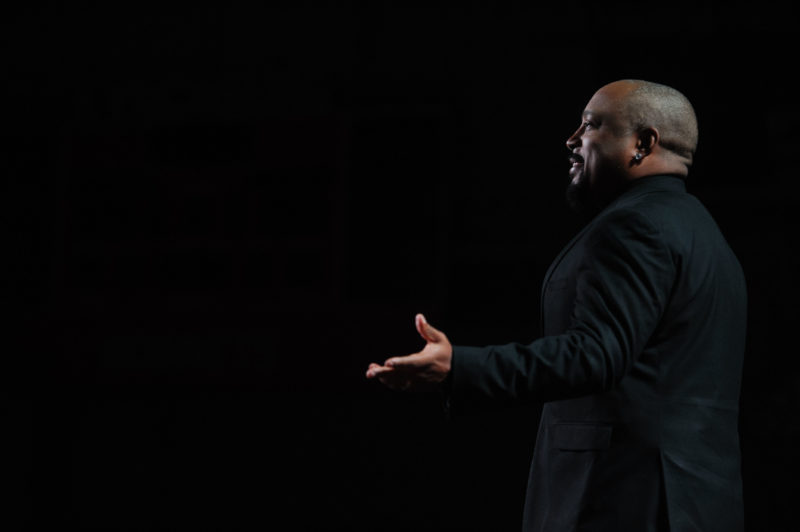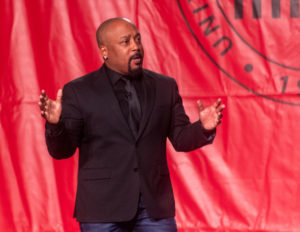When Janae Edwards ’23 heard that Daymond John, star of the Emmy Award-winning TV show “Shark Tank,” was coming to speak at the University of Lynchburg, she was one of the first people to pick up her free ticket from the College of Business.
“I’m a huge fan of his,” Edwards, a transfer student and political science major from Baltimore, said. “He has been an inspiration to me for many years, as a businessman, a ‘Shark,’ and as a person.”
On Thursday, November 21, John — known as the “people’s Shark” — told his rags-to-riches story to a crowd of about 1,400 people at Turner Gymnasium. His talk was part of the Gifford Lecture Series, which is sponsored by the College of Business and brings business leaders to campus to speak about topics related to leadership and ethics.

John, 50, talked about growing up in a single-parent household in Hollis, Queens, New York, and about how at 10 years old, he passed out flyers for $2.35 an hour to help his mom make ends meet.
He talked about starting the lifestyle brand FUBU in the basement of his mother’s house and about how he and his business partners “stalked” hip hop star LL Cool J to get him to be a brand ambassador. John also showed up at rap video shoots with FUBU T-shirts and persuaded the artists — Will Smith, P. Diddy, and others — to wear them on camera.
During the early years, John also was working 60-hour weeks at Red Lobster and confessed to not getting much sleep. “His story is really one of perseverance and determination and that came out clearly last night,” Dr. Nancy Hubbard, dean of the College of Business, said later.
“In a world where people think things come easily, it’s really good to remember that that’s not always the case. … If people look at Daymond John and say, ‘He’s really lucky,’ what really became clear last night is that you make your own luck through hard work and determination and perseverance.”
As John puts it, it’s the story of how “a little brown boy from Queens, who was dyslexic and got left back” in school, became an entrepreneur and a Shark.
During the lecture, John didn’t shy away from mistakes he made while turning FUBU into a multibillion dollar business — mistakes he blamed mostly on a lack of “financial intelligence.”
Like the time, early on in the late 1980s, when he stood out in the cold selling $800 worth of FUBU hats in one day, only to lose it all on the way home. He said he was driving home, thinking about his one-day haul, and counting his money when he rear-ended the car in front of him. With that dull “thud,” $800 was gone.
Or when he and his partners took $300,000 in FUBU orders, with no real plan as to how to fulfill them. John said he was thinking about how he was going to spend all that money when it hit him: “I’ve got to make all these clothes.”
Needing to buy sewing machines and hire seamstresses to fulfill the orders, John tried to get a bank loan. He was turned down by 27 banks. In the end, his mother mortgaged the house. And although he objected at first, she also took out a newspaper ad seeking a partner for the fledgling business. That ad resulted in FUBU’s first strategic partner and $30 million in sales in three months.
Later, when John had achieved a level of fame and wealth and was “hanging out with rappers” all over the world, he had a more personal crisis. His wife left him, taking their two daughters with her.
“The biggest challenge you’re ever going to have in life is work-life balance,” John told the crowd, adding that his wife said, “I didn’t leave you because I don’t love you, but because I do. You’re destroying yourself.”
Through these and other experiences, good and bad, John developed his five “SHARK points,” which he shared with the audience:
Set goals. “You become what you think about most of the time,” he said, adding that in 1986 he decided, “I’m going to live, die, and prosper in the world of hip hop.” He said he reads his goals every night before bed and first thing in the morning.
Homework. As he told another audience recently, “Insight is everything, and you have to truly know your business and your industry to succeed.”
Amore. John said you have to love what you’re doing, while keeping work-life balance in check.
Remember, you are the brand. He told the audience to “put yourself into two to five words” and that “life is a series of pitches.” He also told students to be careful about what they’re posting on social media.
Keep swimming. John said this point was driven home during a 2017 battle with thyroid cancer. As he was being put under before surgery, he said the anesthesiologist told him to think about what true success was. As he drifted off, John said, he was thinking about his daughters.
“The importance of his SHARK points were enhanced by his personal stories and experiences that shaped and molded him into the person he is today,” Edwards said. “He displayed vulnerability and courage when opening up to us about his personal life and some of the hardships he faced.”

Edwards added that she identifies with John, in part, because they both share Trinidadian heritage and a passion for service. Among other things, John sits on the board of the Petco Foundation and the Network for Teaching Entrepreneurship, and is an ambassador for Global Citizens and the Global Poverty Project.
He has worked with the Yale Center for Dyslexia and sits on the advisory board of Understood.org, a group that advocates for people with learning challenges. He also was appointed by President Barack Obama to serve as a Presidential Ambassador for Global Entrepreneurship.
Edwards, who plans to start her own business someday, said, “For me, I am trying to find that balance within myself. I have a strong interest in philanthropy, nonprofit, and charity work. I hope to establish a good reputation for myself and earn enough money to make substantial contributions to organizations and give back to my community.”
At the end of the lecture, Edwards was one of several students who got to ask John a question. A longtime FUBU fan, she asked John about his brand and its future. Before he answered the question, however, John invited Edwards to step closer to the stage.
“When I asked him about his brand and he called me to the stage, I could hardly contain my excitement,” she said. “I felt a rush of energy, which seemed to be a culmination of nerves and being star-struck.
“I thought it would be impossible to talk to Mr. John, even though it was a life goal of mine. If I could speak to him [again], I would thank him once again for the amazing opportunity that he provided the students here, especially because his story resonates so deeply with me.”
After the lecture, John hung around to talk with some of Lynchburg’s business majors at a reception at Hall Campus Center. “He was fantastic,” Hubbard said. “He sat and answered their questions. It was so satisfying to see the looks on their faces when they talked to him, and they really believe that with hard work and determination just about everything is possible.”
About the Richard P. Gifford Lecture Series
The late Richard P. Gifford was a vice president for General Electric and a leader in the business, civic, educational, and religious life of the Lynchburg community. After his death, friends and business colleagues established in his honor and memory an endowment that brings to the University of Lynchburg and local community a series of outstanding and nationally recognized executives and scholars in business, leadership, and economics.
You can read more about the Gifford Lecture Series, including past speakers, here.

